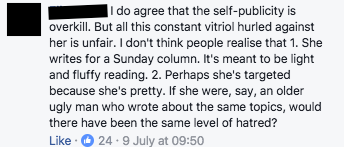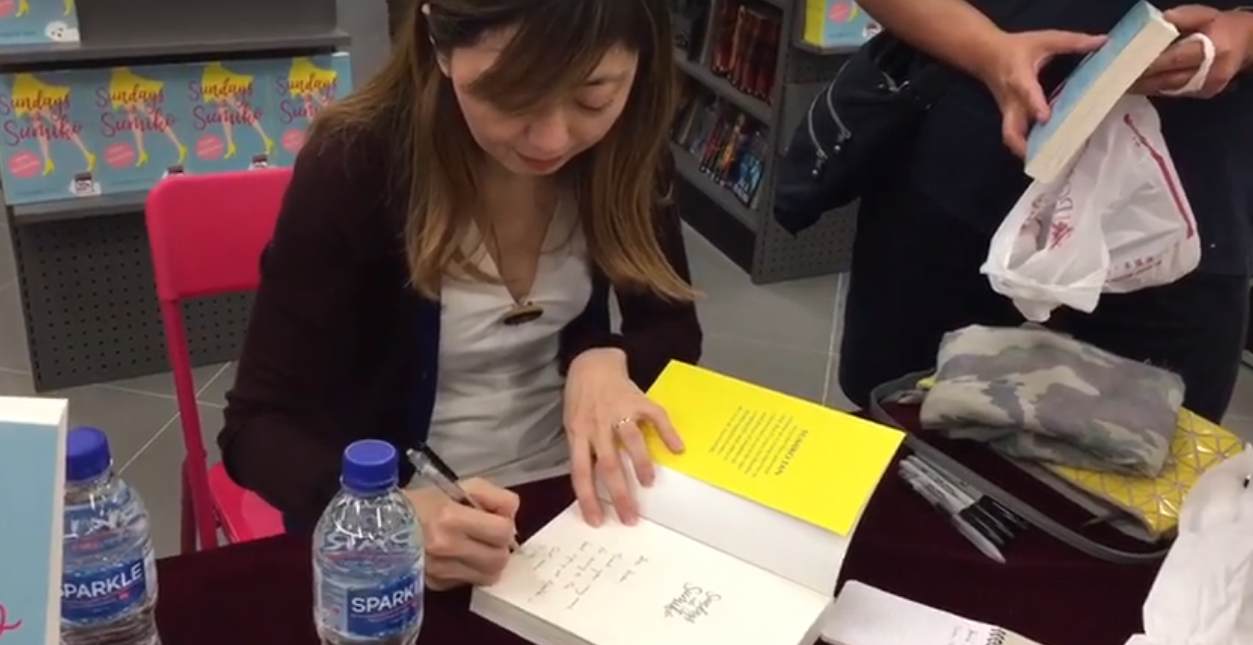This must be a new career low: I am seeking out fans of a woman whose newspaper columns I use to wrap vegetables.
I am not one of them, but it’s definitely not her loss. Sumiko Tan has dozens willing to queue for her autograph, while I can’t even get my own mother to create a Facebook account so she can share my articles.
Her fans devour her columns without an ounce of irony. They earnestly comment on articles about her to show support, even though her vocal detractors appear to far outnumber them. And on 9th July, they turned up at her first book signing to meet the woman who, for years, gave a voice to the simple moments in life that they didn’t know how to put into words.
After speaking to a few, I am also convinced they are not make believe humans created by ST to justify her column.

They feel invested in her life and well-being, and want to know every sordid detail of her joys and heartaches – just like one would with a friend, neighbour or daughter.
“When she had a column in Sunday Times, I looked forward to getting the papers every weekend. Her column would be the first piece I read in that thick stack,” shares Joy Chua, an unabashed Sumiko fan.
Naturally, the 58-year old wants Sumiko’s book and autograph. In her opinion, everything Sumiko writes is “good to read because everything she writes is personal”.
What Joy means is that Sumiko has tapped into the secret of being a good writer: turning an otherwise trivial occurrence into engaging and relatable insight (to your target audience).
But what is good writing and who gets to be the judge?
Joy’s sentiments are heavily echoed by other fans. To them, good writing is relatability, plain and simple. It is being able to express a personal experience as a universal feeling, with language for the layman. It is being able to hit home for a reader with minimal effort.
Irene Lim, a banker, points out: “Her columns are like reality TV or a Korean drama, where I can just relax and watch, or in this case, read, without having to think too much. The experiences she shares also make me feel less alone, since someone else feels the same way.”

“Once, Sumiko wrote about having to spend time with her stepdaughter and what went through her mind. Those were real fears that any stepmother can identify with. There was also another well-written article from 1999 titled ‘I’m Already 35 and Still Single’, which was down-to-earth and empathetic.”
Critics don’t understand why the national newspaper would encourage such navel-gazing. They think her personal observations are hopelessly banal and the height of our ‘failing journalism’.
Arguably, her introspection could be more nuanced. Yet, it is precisely the ordinary nature of her anecdotes that pleases her fans, who enjoy living vicariously through her stories and wholeheartedly embrace the quintessential Singaporean kaypoh spirit.
Essentially, their ardent support reminds me that we aren’t just curious about the big events in others’ lives. Little things can also tell us a lot about a person – how they fold their towel, what they buy at the supermarket, what book they read before bed.

In her Lunch With Sumiko Tan column, she describes positively inane details about the restaurant’s setting and the food eaten, in order to paint a picture of the interviewee’s character or draw a life lesson.
Sumiko’s fans live for her revelations – they aren’t just reflections of their own everyday life, but also provide a semblance of hope that the average Singaporean can find meaning in the mundane.
But these fans are far from stupid or dumb. They simply recognise and support Sumiko’s obvious superpower: elevating a light Sunday read into something as passionately consumed as ‘serious’ news.
As Irene puts it, “Her writing is genuine, not rude or condescending, and does not try to make a statement for the sake of it.”

One such fan is Peter Kuek. At 40 years old, he occasionally reads her personal columns, but really noticed her when she cut her teeth on crime reporting. He likes that her pieces were “factual and engaging”.
I can’t help thinking: of course they are factual. What else do you expect from crime?
But his mention of Sumiko’s early career days piques my interest. After probing further, I realise all the fanboy wants is the date to her next book signing session.
Eventually, Peter brings up a good point – it’s not easy making engaging articles look effortless. If effortlessness is a measure of success, then the more critics say “anyone can write like that”, the more a writer has succeeded.
Mary Lee, a software engineer in her 30s, doesn’t read Sumiko’s columns religiously, but also appreciates her conversational style of writing.
“She doesn’t just interview someone for the sake of an article. Instead, she incorporates day-to-day happenings, like having breakfast with them as well. Her reporting style is casual and easy.”
The trite journalism adage applies: easy reading is damn hard writing.

I sense that the one thing they admire most about her has less to do with her words, and more that she bravely continues to write them despite harsh criticism.
When I first decided to write this piece, I wanted to have my very own Lunch With Sumiko Tan. Unfortunately, she politely declined my interview offer over email: “I think people are quite sick of me already, with the stories that have already run :)” Her considerable measure of self-awareness earned a little respect from me, but maybe I’m just cheap.
She is consistently vulnerable because, I suspect, she truly enjoys baring her soul to readers, haters be damned.
To her fans, there’s something about this bold degree of personal honesty that is equally intimidating and admirable.
Mary says, “Sometimes, Sumiko doesn’t always go with majority opinion. And she also likes to talk about her own experiences. Readers may not understand that her articles don’t need to be politically correct, hence it’s expected she gets unnecessary hatred.”
So I may never have her astounding capacity for vulnerability, her endurance in facing keyboard warriors, or even one person queueing for my autograph.
But, for what it’s worth, I still aim to reach a point in my career where I can write an entire column about buying an oven.






